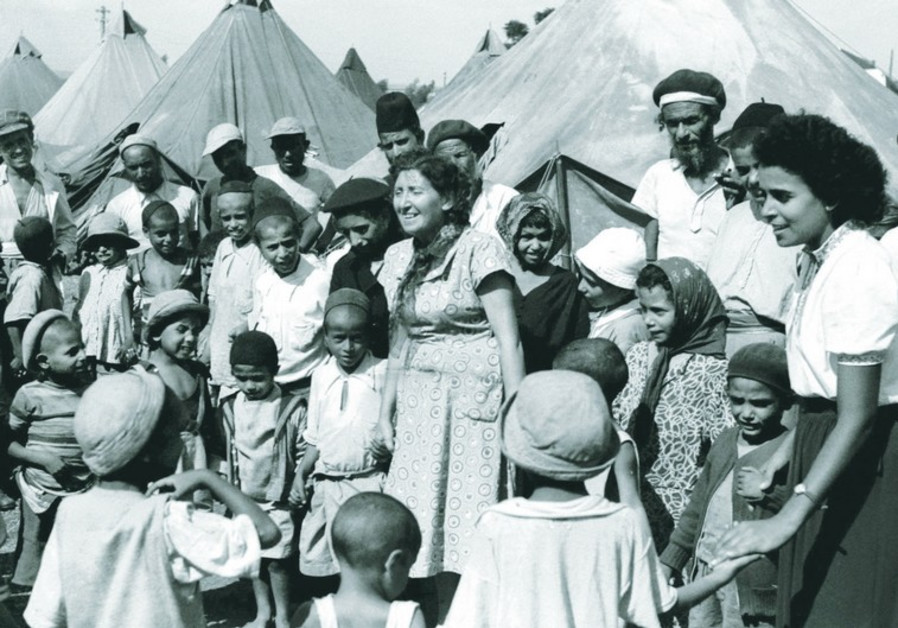Shout for the stolen babies
Immigrants from Yemen in a tent encampment in Israel in 1949. Photo by Reuters
From Yemenites to Palestinians
In the struggle against subjugation and power there is hope that the comparison will help more people come out of the closet – and not 66 years later – to break the silence, resist oppression and forge a coalition
By Amira Hass, Haaretz premium
August 16, 2017
The scandal of the abducted Yemenite (and other) children refuses to die down, thankfully, and the more it is talked about and remembered, the better. Even if those directly responsible are not here to answer for their actions, it has been proven again and again how just were the families’ complaints.
This time it was an article on Friday in Yedioth Ahronoth that brought the story of the abducted Yemenite children back to us. Tamar Kaplansky interviewed Shulamit Malik, who in the early 1950s was a childcare worker in a Hapoel Hamizrahi daycare facility in the Yatziv immigrant transit camp. Malik initiated the interview; she read an opinion piece by Kaplansky and decided to break her silence.

A young Yemenite girl carrying her brother through the mud in the Beit Lid camp, Israel, 1950. Photo by Zoltan Kluger / GPO
It emerged that Malik had broken her silence for the first time 20 years ago. She contacted Rami Tzuberi, an attorney who was representing some of the families of children who had disappeared. Tzuberi said he gave Malik’s name to the commission of inquiry, but she was never called to testify. As a childcare worker, she realized the connection between the elegant delegations who came to visit the facility and the healthy babies who disappeared a few days later. And after she became a grandmother, she recalled in despair the parents who came to take their children – after a long day’s work – and discovered an empty bed.
Her testimony does not tell new things about the phenomenon itself. She reconfirms how accurate the families were, all through the decades, when they talked about the methodical disappearance of babies.
The families and activists, who did not let the matter die down, can serve as an inspiration to any subjugated and silenced group in society. The affair is an important lesson for every journalist and editor: Please, listen to people. Especially when they are not important, rich, famous, smooth-talking and highly placed. Listen to them even if a camera did not document everything that happened and they don’t have official documents to back up their reports. Show basic scepticism toward anyone in power. They always have something to hide, under plenty of ridicule and arrogance.
We did not come just to describe reality but mainly to change it
The temptation to draw a parallel with our subjugated Palestinians – and not just hint at it – is great. Because we did not come just to describe reality, but mainly to change it. In the struggle against subjugation and power there is hope that the comparison will help more people come out of the closet – and not 66 years later – to break the silence, resist oppression and forge a coalition.

Shlomi Hatuka’s grandmother with Mazal, one of the twin daughters she gave birth to in an Israeli hospital. She was told the other twin had died Although the scandal focused on Yemeni mothers and babies there were also significant numbers of disappeared children from parents born in Iraq, Morocco, Tunisia and the Balkans.
But the temptation not to draw a parallel is even greater. Our political culture today, with the harsh amplifiers of social media, does not allow the logic of such a parallel to be heard. In our time, the establishment of that earlier era that abducted mainly Jewish-Arab children is identified instantly with the Ashkenazi, on the one hand, and the treacherous, leftist Arab-lovers on the other. And so to many, it is apparently a mere trivial detail that the daycare facility where Malik worked was run by Hapoel Hamizrahi, which was not exactly left-wing, and that from it grew the National Religious Party and later Habayit Hayehudi, just as Kaplansky says.
Neither does our public absorb the fact that the Mapai-Mapam establishment used socialist (leftist) practices as a tool to achieve ultra-nationalist, ethnic goals (conquest of the soil, banishment of the Palestinians). The banishment-minded establishment remains as it was: Even if today it does not include only Ashkenazim, even if the successors to Mapai disavow, and rightfully so, the title “leftist,” even if children are not abducted but led to lesser educational tracks. The way terminology is so commonly beclouded, the right wing makes use of the abducted children against the anti-nationalist left; that is, against the occupation’s opponents.
Let us not be like them. Recognition of the methodical, calculated injustice that the Ashkenazi (yes!) establishment perpetrated on the abducted children and their families is not conditioned on opposition to the methodical Israeli policy of defeating the Palestinians.
See original story by Jonathan Cook, Israel’s stolen children

